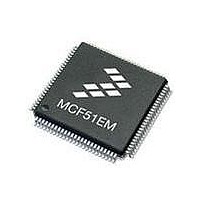MCF51EM256CLL Freescale Semiconductor, MCF51EM256CLL Datasheet - Page 169

MCF51EM256CLL
Manufacturer Part Number
MCF51EM256CLL
Description
IC MCU 32BIT 256KB FLASH 100LQFP
Manufacturer
Freescale Semiconductor
Series
MCF51EMr
Datasheets
1.MCF51EM128CLL.pdf
(2 pages)
2.MCF51EM128CLL.pdf
(54 pages)
3.MCF51EM128CLL.pdf
(636 pages)
Specifications of MCF51EM256CLL
Core Processor
Coldfire V1
Core Size
32-Bit
Speed
50MHz
Connectivity
I²C, SCI, SPI
Peripherals
LCD, LVD, PWM, WDT
Number Of I /o
63
Program Memory Size
256KB (256K x 8)
Program Memory Type
FLASH
Ram Size
16K x 8
Voltage - Supply (vcc/vdd)
1.8 V ~ 3.6 V
Data Converters
A/D 16x12b
Oscillator Type
External
Operating Temperature
-40°C ~ 85°C
Package / Case
100-LQFP
Processor Series
MCF51EM
Core
ColdFire V1
Data Bus Width
32 bit
Data Ram Size
16 KB
Interface Type
RS-232, LIN
Maximum Clock Frequency
50 MHz
Number Of Timers
3
Operating Supply Voltage
1.8 V to 3.6 V
Maximum Operating Temperature
+ 85 C
Mounting Style
SMD/SMT
3rd Party Development Tools
JLINK-CF-BDM26, EWCF
Development Tools By Supplier
DEMOEM
Minimum Operating Temperature
- 40 C
Lead Free Status / RoHS Status
Lead free / RoHS Compliant
Eeprom Size
-
Lead Free Status / Rohs Status
Lead free / RoHS Compliant
Available stocks
Company
Part Number
Manufacturer
Quantity
Price
Company:
Part Number:
MCF51EM256CLL
Manufacturer:
FREESCALE
Quantity:
110
Company:
Part Number:
MCF51EM256CLL
Manufacturer:
Freescale Semiconductor
Quantity:
10 000
- Current page: 169 of 636
- Download datasheet (11Mb)
The write to SRS that services (clears) the COP counter should not be placed in an interrupt service routine
(ISR) because the ISR could continue to be executed periodically even if the main application program
fails.
If the bus clock source is selected, the COP counter does not increment while the microcontroller is in
background debug mode or while the system is in stop mode. The COP counter resumes when the
microcontroller exits background debug mode or stop mode.
If the 1 kHz clock source is selected, the COP counter is re-initialized to zero upon entry to either
background debug mode or stop mode and begins from zero upon exit from background debug mode or
stop mode.
7.3.3
The default configuration of the V1 ColdFire core enables the generation of an MCU reset in response to
the processor's attempted execution of an illegal instruction (except for the ILLEGAL opcode), illegal line
A, illegal line F instruction or the detection of a privilege violation (attempted execution of a supervisor
instruction while in user mode).
The attempted execution of the STOP instruction with (SOPT[STOPE] = 0 && SOPT[WAITE] = 0) is
treated as an illegal instruction.
The attempted execution of the HALT instruction with XCSR[ENBDM] = 0 is treated as an illegal
instruction.
The processor generates a reset in response to any of these events if CPUCR[IRD] = 0. If this
configuration bit is set, the processor generates the appropriate exception instead of forcing a reset.
7.3.4
The default configuration of the V1 ColdFire core enables the generation of an MCU reset in response to
any processor-detected address error, bus error termination, RTE format error or fault-on-fault condition.
The processor generates a reset if CPUCR[ARD] = 0. If this configuration bit is set, the processor
generates the appropriate exception instead of forcing a reset, or simply halts the processor in response to
the fault-on-fault condition.
7.4
The interrupt architecture of ColdFire utilizes a 3-bit encoded interrupt priority level sent from the
interrupt controller to the core, providing 7 levels of interrupt requests. Level 7 represents the highest
priority interrupt level, while level 1 is the lowest priority. The processor samples for active interrupt
requests once per instruction by comparing the encoded priority level against a 3-bit interrupt mask
value (I) contained in bits 10:8 of the processor’s status register (SR). If the priority level is greater than
the SR[I] field at the sample point, the processor suspends normal instruction execution and initiates
interrupt exception processing.
Level 7 interrupts are treated as non-maskable and edge-sensitive within the processor, while levels 1-6
are treated as level-sensitive and may be masked depending on the value of the SR[I] field. For correct
Freescale Semiconductor
Interrupts & Exceptions
Illegal Opcode Detect (ILOP)
Illegal Address Detect (ILAD)
MCF51EM256 Series ColdFire Integrated Microcontroller Reference Manual, Rev. 8
Resets, Interrupts, and General System Control
7-3
Related parts for MCF51EM256CLL
Image
Part Number
Description
Manufacturer
Datasheet
Request
R

Part Number:
Description:
BOARD DEMO HARDWARE ONLY
Manufacturer:
Freescale Semiconductor
Datasheet:

Part Number:
Description:
IC MCU 32BIT 128KB FLASH 100LQFP
Manufacturer:
Freescale Semiconductor
Datasheet:

Part Number:
Description:
IC MCU 32BIT 128KB FLASH 80LQFP
Manufacturer:
Freescale Semiconductor
Datasheet:

Part Number:
Description:
IC MCU 32BIT 256KB FLASH 80LQFP
Manufacturer:
Freescale Semiconductor
Datasheet:
Part Number:
Description:
Manufacturer:
Freescale Semiconductor, Inc
Datasheet:
Part Number:
Description:
Manufacturer:
Freescale Semiconductor, Inc
Datasheet:
Part Number:
Description:
Manufacturer:
Freescale Semiconductor, Inc
Datasheet:
Part Number:
Description:
Manufacturer:
Freescale Semiconductor, Inc
Datasheet:
Part Number:
Description:
Manufacturer:
Freescale Semiconductor, Inc
Datasheet:
Part Number:
Description:
Manufacturer:
Freescale Semiconductor, Inc
Datasheet:
Part Number:
Description:
Manufacturer:
Freescale Semiconductor, Inc
Datasheet:
Part Number:
Description:
Manufacturer:
Freescale Semiconductor, Inc
Datasheet:
Part Number:
Description:
Manufacturer:
Freescale Semiconductor, Inc
Datasheet:
Part Number:
Description:
Manufacturer:
Freescale Semiconductor, Inc
Datasheet:











